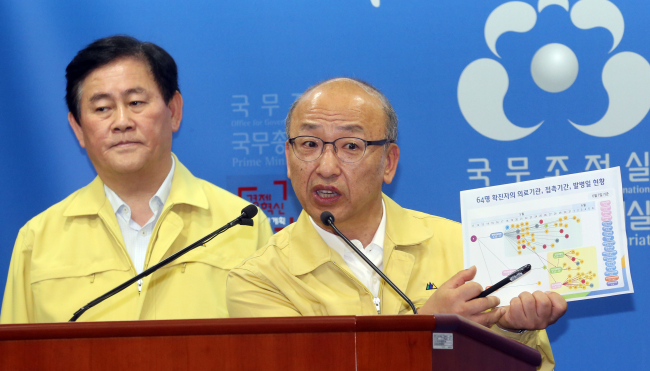South Korea on Sunday disclosed the names of six hospitals with confirmed cases of Middle East respiratory syndrome along with 18 others that MERS patients have visited, vowing “all-out” efforts to contain the recent outbreak.
The announcement followed intensifying calls for transparent information from the public with the number of MERS patients climbing to 64 as of Sunday morning, less than a month since the initial outbreak.
Samsung Medical Center, Seoul St. Mary’s Hospital and Seoul Asan Hospital, three of the five largest hospitals in Seoul, were among those named. The list also included St. Mary’s Hospital in Pyeongtaek, Gyeonggi Province, which has seen 37 cases of MERS; Asan Seoul Clinic in South Chungcheong Province; and Dae Cheong Hospital and KonYang University Hospital in Daejeon.
“(The announcement) represents shifting the government’s strategy, toward ‘all-out’ efforts to end the MERS situation in its early stages,” said acting Prime Minister Choi Kyung-hwan in an emergency briefing at Seoul Government Complex.
 |
| Health Minister Moon Hyung-pyo speaks at a press conference held at the Prime Minister’s Office in Seoul with acting Prime Minister Choi Kyung-hwan attending Sunday. (Yonhap) |
“We are revealing the names of hospitals to show that the government is accurately keeping track of confirmed patients. We will continue to disclose hospital names to actively find infected individuals within the hospital and prevent the spread of the disease,” Choi said.
But the authorities said they would not upgrade the alert level for MERS from its current “caution” status, he said, despite ongoing calls to change it. Nor was the government considering creating a new budget to handle MERS, as it would use funds reserved for national emergencies instead, he added.
The acting premier explained that the government had refrained from revealing the information out of fear that it may spark nationwide panic and create a vacuum in medical treatment in hospitals involved. But the authorities, including President Park Geun-hye, have decided that the benefits of disclosing information outweigh the possible side effects, he added.
Earlier in the day, the Health Ministry said the MERS outbreak had infected 64 people and claimed five, fueling public fear that the situation was en route to an epidemic.
The ministry confirmed the death of a 75-year-old man who was exposed to the virus from May 27 to 29, when he shared an emergency room at Samsung Medical Center in Seoul with Korea’s 14th MERS patient. He died Friday, and a postmortem test confirmed the disease Sunday.
He was one of the 14 cases confirmed early in the day. Among them, 10 were infected at Samsung Medical Center. With 17 cases to date, the facility is the source of the most MERS cases behind St. Mary’s Hospital in Pyeongtaek.
According to an emergency briefing by the Samsung Medical Center, 893 people came in contact with MERS patients at the facility and are being monitored, for whom the hospital expressed “deep regret.”
Both the government and the hospital, however, emphasized that all MERS infections reported so far have occurred within the hospital walls, and that the disease has not yet spread to the general public.
The government’s response to handling the outbreak has been subject to condemnation from rival political parties, heads of regional governments and the general public. Such criticism intensified after the list of hospital names it revealed Sunday had erroneously marked the location of St. Mary’s Family Medicine Clinic Center in Seoul as Gunpo, Gyeonggi Province.
Moon Jae-in, head of the main opposition New Politics Alliance for Democracy, blasted the Park administration for failing to provide proper countermeasures in light of the emergency.
“We no longer believe that the country will protect the lives and safety of our citizens. People are anxious and frustrated, and left wondering what they should and should not do,” he said.
Ruling Saenuri’s chief Kim Moo-sung defined the MERS situation as a “national crisis” and urged bipartisan cooperation from the lawmakers.
The two party leaders unveiled a series of demands on the government including: a comprehensive countermeasure involving the regional government, education offices and the civilian factor, the government’s sharing of necessary information related to MERS, upgrading the alert status and providing subsidies for possible financial damages inflicted upon medical facilities.
Just 18 days after the country’s patient zero was confirmed of MERS, Korea now has the third-highest number of MERS patients in the world behind Saudi Arabia and the United Arab Emirates. As of Sunday, the MERS scare led 1,276 schools and kindergartens across the country to cancel classes.
But there has been nationwide concern that the situation will escalate even further.
On Saturday, a 61-year-old man tested positive for the infection in an initial test in the country’s southernmost city of Busan. He was demonstrating some symptoms of the disease such as vomiting, but did not show signs of fever or respiratory problems.
The patient had attended his cousin’s funeral in Bucheon, Gyeonggi Province, where a confirmed MERS patient had also been present. Authorities said they were conducting an investigation on who came into contact with him since the funeral.
By Yoon Min-sik (minsikyoon@heraldcorp.com)

